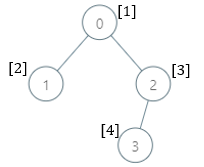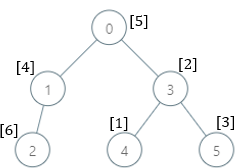| comments | difficulty | edit_url | rating | source | tags | ||||
|---|---|---|---|---|---|---|---|---|---|
true |
Hard |
2415 |
Weekly Contest 258 Q4 |
|
There is a family tree rooted at 0 consisting of n nodes numbered 0 to n - 1. You are given a 0-indexed integer array parents, where parents[i] is the parent for node i. Since node 0 is the root, parents[0] == -1.
There are 105 genetic values, each represented by an integer in the inclusive range [1, 105]. You are given a 0-indexed integer array nums, where nums[i] is a distinct genetic value for node i.
Return an array ans of length n where ans[i] is the smallest genetic value that is missing from the subtree rooted at node i.
The subtree rooted at a node x contains node x and all of its descendant nodes.
Example 1:
Input: parents = [-1,0,0,2], nums = [1,2,3,4] Output: [5,1,1,1] Explanation: The answer for each subtree is calculated as follows: - 0: The subtree contains nodes [0,1,2,3] with values [1,2,3,4]. 5 is the smallest missing value. - 1: The subtree contains only node 1 with value 2. 1 is the smallest missing value. - 2: The subtree contains nodes [2,3] with values [3,4]. 1 is the smallest missing value. - 3: The subtree contains only node 3 with value 4. 1 is the smallest missing value.
Example 2:
Input: parents = [-1,0,1,0,3,3], nums = [5,4,6,2,1,3] Output: [7,1,1,4,2,1] Explanation: The answer for each subtree is calculated as follows: - 0: The subtree contains nodes [0,1,2,3,4,5] with values [5,4,6,2,1,3]. 7 is the smallest missing value. - 1: The subtree contains nodes [1,2] with values [4,6]. 1 is the smallest missing value. - 2: The subtree contains only node 2 with value 6. 1 is the smallest missing value. - 3: The subtree contains nodes [3,4,5] with values [2,1,3]. 4 is the smallest missing value. - 4: The subtree contains only node 4 with value 1. 2 is the smallest missing value. - 5: The subtree contains only node 5 with value 3. 1 is the smallest missing value.
Example 3:
Input: parents = [-1,2,3,0,2,4,1], nums = [2,3,4,5,6,7,8] Output: [1,1,1,1,1,1,1] Explanation: The value 1 is missing from all the subtrees.
Constraints:
n == parents.length == nums.length2 <= n <= 1050 <= parents[i] <= n - 1fori != 0parents[0] == -1parentsrepresents a valid tree.1 <= nums[i] <= 105- Each
nums[i]is distinct.
We notice that each node has a unique gene value, so we only need to find the node
Therefore, we initialize the answer array
We can start from node
Next, we start from
Then, we update the answer for node
Finally, we return the answer array
The time complexity is
class Solution:
def smallestMissingValueSubtree(
self, parents: List[int], nums: List[int]
) -> List[int]:
def dfs(i: int):
if vis[i]:
return
vis[i] = True
if nums[i] < len(has):
has[nums[i]] = True
for j in g[i]:
dfs(j)
n = len(nums)
ans = [1] * n
g = [[] for _ in range(n)]
idx = -1
for i, p in enumerate(parents):
if i:
g[p].append(i)
if nums[i] == 1:
idx = i
if idx == -1:
return ans
vis = [False] * n
has = [False] * (n + 2)
i = 2
while idx != -1:
dfs(idx)
while has[i]:
i += 1
ans[idx] = i
idx = parents[idx]
return ansclass Solution {
private List<Integer>[] g;
private boolean[] vis;
private boolean[] has;
private int[] nums;
public int[] smallestMissingValueSubtree(int[] parents, int[] nums) {
int n = nums.length;
this.nums = nums;
g = new List[n];
vis = new boolean[n];
has = new boolean[n + 2];
Arrays.setAll(g, i -> new ArrayList<>());
int idx = -1;
for (int i = 0; i < n; ++i) {
if (i > 0) {
g[parents[i]].add(i);
}
if (nums[i] == 1) {
idx = i;
}
}
int[] ans = new int[n];
Arrays.fill(ans, 1);
if (idx == -1) {
return ans;
}
for (int i = 2; idx != -1; idx = parents[idx]) {
dfs(idx);
while (has[i]) {
++i;
}
ans[idx] = i;
}
return ans;
}
private void dfs(int i) {
if (vis[i]) {
return;
}
vis[i] = true;
if (nums[i] < has.length) {
has[nums[i]] = true;
}
for (int j : g[i]) {
dfs(j);
}
}
}class Solution {
public:
vector<int> smallestMissingValueSubtree(vector<int>& parents, vector<int>& nums) {
int n = nums.size();
vector<int> g[n];
bool vis[n];
bool has[n + 2];
memset(vis, false, sizeof(vis));
memset(has, false, sizeof(has));
int idx = -1;
for (int i = 0; i < n; ++i) {
if (i) {
g[parents[i]].push_back(i);
}
if (nums[i] == 1) {
idx = i;
}
}
vector<int> ans(n, 1);
if (idx == -1) {
return ans;
}
function<void(int)> dfs = [&](int i) {
if (vis[i]) {
return;
}
vis[i] = true;
if (nums[i] < n + 2) {
has[nums[i]] = true;
}
for (int j : g[i]) {
dfs(j);
}
};
for (int i = 2; ~idx; idx = parents[idx]) {
dfs(idx);
while (has[i]) {
++i;
}
ans[idx] = i;
}
return ans;
}
};func smallestMissingValueSubtree(parents []int, nums []int) []int {
n := len(nums)
g := make([][]int, n)
vis := make([]bool, n)
has := make([]bool, n+2)
idx := -1
ans := make([]int, n)
for i, p := range parents {
if i > 0 {
g[p] = append(g[p], i)
}
if nums[i] == 1 {
idx = i
}
ans[i] = 1
}
if idx < 0 {
return ans
}
var dfs func(int)
dfs = func(i int) {
if vis[i] {
return
}
vis[i] = true
if nums[i] < len(has) {
has[nums[i]] = true
}
for _, j := range g[i] {
dfs(j)
}
}
for i := 2; idx != -1; idx = parents[idx] {
dfs(idx)
for has[i] {
i++
}
ans[idx] = i
}
return ans
}function smallestMissingValueSubtree(parents: number[], nums: number[]): number[] {
const n = nums.length;
const g: number[][] = Array.from({ length: n }, () => []);
const vis: boolean[] = Array(n).fill(false);
const has: boolean[] = Array(n + 2).fill(false);
const ans: number[] = Array(n).fill(1);
let idx = -1;
for (let i = 0; i < n; ++i) {
if (i) {
g[parents[i]].push(i);
}
if (nums[i] === 1) {
idx = i;
}
}
if (idx === -1) {
return ans;
}
const dfs = (i: number): void => {
if (vis[i]) {
return;
}
vis[i] = true;
if (nums[i] < has.length) {
has[nums[i]] = true;
}
for (const j of g[i]) {
dfs(j);
}
};
for (let i = 2; ~idx; idx = parents[idx]) {
dfs(idx);
while (has[i]) {
++i;
}
ans[idx] = i;
}
return ans;
}impl Solution {
pub fn smallest_missing_value_subtree(parents: Vec<i32>, nums: Vec<i32>) -> Vec<i32> {
fn dfs(
i: usize,
vis: &mut Vec<bool>,
has: &mut Vec<bool>,
g: &Vec<Vec<usize>>,
nums: &Vec<i32>,
) {
if vis[i] {
return;
}
vis[i] = true;
if nums[i] < (has.len() as i32) {
has[nums[i] as usize] = true;
}
for &j in &g[i] {
dfs(j, vis, has, g, nums);
}
}
let n = nums.len();
let mut ans = vec![1; n];
let mut g: Vec<Vec<usize>> = vec![vec![]; n];
let mut idx = -1;
for (i, &p) in parents.iter().enumerate() {
if i > 0 {
g[p as usize].push(i);
}
if nums[i] == 1 {
idx = i as i32;
}
}
if idx == -1 {
return ans;
}
let mut vis = vec![false; n];
let mut has = vec![false; (n + 2) as usize];
let mut i = 2;
let mut idx_mut = idx;
while idx_mut != -1 {
dfs(idx_mut as usize, &mut vis, &mut has, &g, &nums);
while has[i] {
i += 1;
}
ans[idx_mut as usize] = i as i32;
idx_mut = parents[idx_mut as usize];
}
ans
}
}
